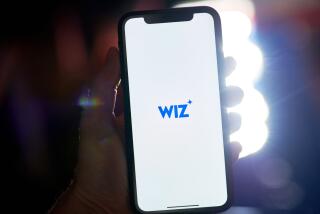Despite Warnings, Opposition Unlikely
- Share via
WASHINGTON — America Online Inc.’s proposed acquisition of Time Warner Inc. is not likely to draw much government opposition despite some warnings from lawmakers and consumer groups that the deal may limit choices in Internet access.
Although the proposed union of the nation’s largest Internet service provider and one of the world’s biggest entertainment companies continues a decadelong media consolidation, experts say the AOL-Time Warner deal does not appear to be anti-competitive because it is unlikely to affect the price and availability of Internet access or entertainment products.
“It’s very unlikely that this deal gets blocked,” said Scott C. Cleland, analyst with the Precursor Group investment research arm of Legg Mason Wood Walker Inc. “I don’t see any huge regulatory issues.”
The Federal Communications Commission will review the transfer of Time Warner’s communications licenses to determine if the deal is in the public interest. Either the Federal Trade Commission or the Justice Department will review the proposed merger to see if it passes antitrust muster.
But several lawmakers and consumers groups wasted no time Monday decrying the deal.
“I am deeply troubled by the announcement today that AOL is acquiring Time Warner in the biggest corporate merger ever,” said Sen. Paul Wellstone (D-Minn.). “With media companies narrowly focused only on the bottom line, I am very concerned about the effect these massive mergers will have on the flow of information in our democracy.”
Sen. Orrin G. Hatch (R-Utah), chairman of the powerful Judiciary Committee, said his committee “will study the merger closely for its potential impact on both consumers and competition in the Internet market.”
Capitol Hill lawmakers have in the past publicly blasted several big mergers, but their words traditionally have little impact on the independent regulatory review of business transactions by federal agencies.
But the issue of open access touches this deal because AOL in the past has tried to get the government to force AT&T; Corp. and other cable operators to open its high-speed cable lines so that consumers could choose among Internet service companies.
Cable companies counter that their high-speed networks are costly to build and that they should not be open to all comers.
Most cable companies, including Time Warner’s Road Runner unit, have offered cable customers only their own high-speed gateway to the Internet. As a result, cable customers who wanted access to AOL or any other Internet Service provider had to pay extra.
In reaction to the apparent sensitivity of this issue, Time Warner Chairman and Chief Executive Gerald Levin said he and AOL Chairman Steve Case have agreed to take the open-access issue off the table.
“We are going to take the open-access issue out of Washington, out of city hall and put it into the marketplace,” Levin said at a news conference.
But some consumer advocates remain skeptical that the companies will keep their promise.
James Love, head of the Washington-based Consumer Project on Technology, said AOL failed to keep promises to support the open-source development of the Netscape browser when AOL purchased Netscape last year.
“Open access is the issue of whether cable broadband consumers may choose the Internet service provider of their choice without being forced to accept a cable industry-owned ISP such as Excite@Home or Road Runner,” said Rep. Edward J. Markey (D-Mass.), a member of the House Telecommunications Subcommittee. “Thousands of competing ISPs are asking whether AOL now stands for ‘All Others Left out’ or ‘All Others Let in.’ ”
More to Read
The biggest entertainment stories
Get our big stories about Hollywood, film, television, music, arts, culture and more right in your inbox as soon as they publish.
You may occasionally receive promotional content from the Los Angeles Times.










